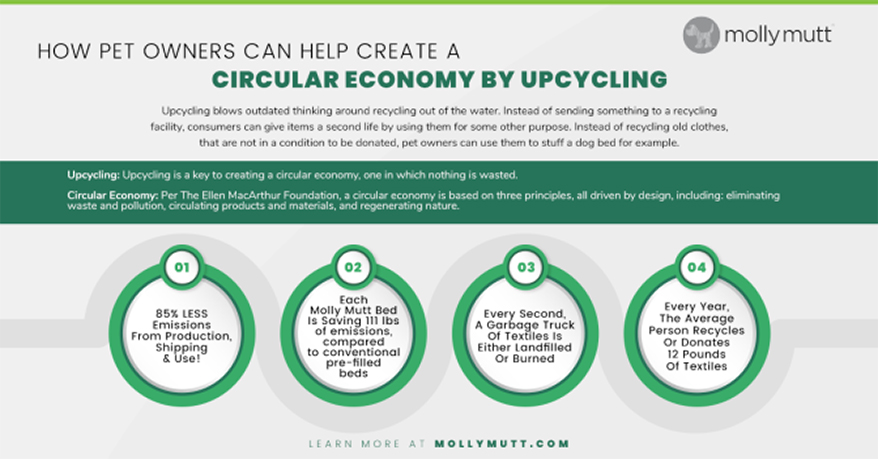
(PRESS RELEASE) OAKLAND, CA — The climate crisis demands a zero-waste, circular economy. One weapon in the arsenal against climate change is upcycling.
“We need to change behaviors, not just talk about sustainability. Everything from the way we do business to the way we take care of our pets and manage our households must continuously evolve in an effort to create a zero-waste, circular economy,” said Molly Mundt, co-founder of Molly Mutt. “The environmental crisis is here, and it is only going to get worse if we don’t continue to hammer away at changing patterns and reversing the damage done to our planet.”
Upcycling blows outdated thinking around recycling out of the water. Instead of sending something to a recycling facility consumers can immediately give items a second life by using them for some other purpose. Instead of recycling old clothes, that are not in condition to be donated, pet owners can use them to stuff a dog bed for example.
Upcycling is a key to creating a circular economy, one in which nothing is wasted. A circular economy is “a model of production and consumption, which involves sharing, leasing, reusing, repairing, refurbishing and recycling existing materials and products as long as possible.”
Molly Mutt, an eco-conscious lifestyle retailer that offers a wide range of pet-related products, says that pet owners have the opportunity to help create a circular economy with their pet and lifestyle choices.
Advertisement
“The amount of waste that can be upcycled but isn’t, is unbelievable. The good news is that we have already made a difference through lifestyle offerings that rise above the greenwashing we see so prevalent across sectors,” added Mundt.
About Molly Mutt
Molly Mutt’s origin story starts with its co-founder, three muddy mutts, a couple of dirty dog beds, and San Francisco’s famous hills. In 2009, Molly grew tired of trying to wash dirty dog beds that would fall apart and need to be replaced.
The thought of how much waste was being created bothered Molly on an ethical level. “Why aren’t there bed duvet covers like the ones that go on my bed?” Molly asked. From there she and her business partners postulated a sustainable future in pet lifestyle offerings, where beds and products were not only more manageable but better for the environment.
“Our stuff sacks were born out of our drive to support a circular economy and provide options for pet owners to upcycle their old tee-shirts, socks and other garments,” added Mundt. “Each Molly Mutt bed is saving 111 pounds of emissions, compared to conventional pre-filled beds. You can also think of it as saving 11 trees. Molly Mutt customers have upcycled over 3.5 million pounds of textiles.”
Molly Mutt received the Pet Sustainability Accreditation—the only accreditation program in the pet industry that measures and verifies businesses’ sustainability claims. The company has aligned its goals and values with the UN Sustainable Development Goals, and this year we focused on SDG 8 – Decent Work and Economic Health, and SDG 12 – Responsible Consumption and Production. The company also works with EcoCart to help offset emissions from shipping orders.
Advertisement